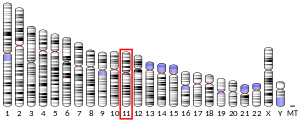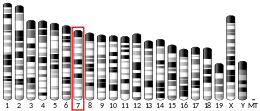TRIM68
Tripartite motif-containing protein 68 is a protein that in humans is encoded by the TRIM68 gene.[5][6]
The protein encoded by this gene contains a RING finger domain, a motif present in a variety of functionally distinct proteins and known to be involved in protein-protein and protein-DNA interactions. This gene is expressed in many cancer cell lines. Its expression in normal tissues, however, was found to be restricted to prostate. This gene was also found to be differentially expressed in androgen-dependent versus androgen-independent prostate cancer cells.[6]
Interactions
TRIM68 has been shown to interact with Androgen receptor.[7]
References
- 1 2 3 GRCh38: Ensembl release 89: ENSG00000167333 - Ensembl, May 2017
- 1 2 3 GRCm38: Ensembl release 89: ENSMUSG00000073968 - Ensembl, May 2017
- ↑ "Human PubMed Reference:".
- ↑ "Mouse PubMed Reference:".
- ↑ Chang GT, Steenbeek M, Schippers E, Blok LJ, van Weerden WM, van Alewijk DC, Eussen BH, van Steenbrugge GJ, Brinkmann AO (Oct 2001). "A novel gene on human chromosome 2p24 is differentially expressed between androgen-dependent and androgen-independent prostate cancer cells". Eur J Cancer. 37 (16): 2129–34. doi:10.1016/S0959-8049(01)00259-3. PMID 11597395.
- 1 2 "Entrez Gene: TRIM68 tripartite motif-containing 68".
- ↑ Miyajima, Naoto; Maruyama Satoru; Bohgaki Miyuki; Kano Satoshi; Shigemura Masahiko; Shinohara Nobuo; Nonomura Katsuya; Hatakeyama Shigetsugu (May 2008). "TRIM68 regulates ligand-dependent transcription of androgen receptor in prostate cancer cells". Cancer Res. United States. 68 (9): 3486–94. doi:10.1158/0008-5472.CAN-07-6059. PMID 18451177.
Further reading
- Hartley JL, Temple GF, Brasch MA (2001). "DNA cloning using in vitro site-specific recombination". Genome Res. 10 (11): 1788–95. doi:10.1101/gr.143000. PMC 310948. PMID 11076863.
- Wiemann S, Weil B, Wellenreuther R, et al. (2001). "Toward a catalog of human genes and proteins: sequencing and analysis of 500 novel complete protein coding human cDNAs". Genome Res. 11 (3): 422–35. doi:10.1101/gr.GR1547R. PMC 311072. PMID 11230166.
- Simpson JC, Wellenreuther R, Poustka A, et al. (2001). "Systematic subcellular localization of novel proteins identified by large-scale cDNA sequencing". EMBO Rep. 1 (3): 287–92. doi:10.1093/embo-reports/kvd058. PMC 1083732. PMID 11256614.
- Billaut-Mulot O, Cocude C, Kolesnitchenko V, et al. (2001). "SS-56, a novel cellular target of autoantibody responses in Sjögren syndrome and systemic lupus erythematosus". J. Clin. Invest. 108 (6): 861–9. doi:10.1172/JCI13469. PMC 200937. PMID 11560955.
- Strausberg RL, Feingold EA, Grouse LH, et al. (2003). "Generation and initial analysis of more than 15,000 full-length human and mouse cDNA sequences". Proc. Natl. Acad. Sci. U.S.A. 99 (26): 16899–903. Bibcode:2002PNAS...9916899M. doi:10.1073/pnas.242603899. PMC 139241. PMID 12477932.
- Ota T, Suzuki Y, Nishikawa T, et al. (2004). "Complete sequencing and characterization of 21,243 full-length human cDNAs". Nat. Genet. 36 (1): 40–5. doi:10.1038/ng1285. PMID 14702039.
- Gerhard DS, Wagner L, Feingold EA, et al. (2004). "The status, quality, and expansion of the NIH full-length cDNA project: the Mammalian Gene Collection (MGC)". Genome Res. 14 (10B): 2121–7. doi:10.1101/gr.2596504. PMC 528928. PMID 15489334.
- Wiemann S, Arlt D, Huber W, et al. (2004). "From ORFeome to biology: a functional genomics pipeline". Genome Res. 14 (10B): 2136–44. doi:10.1101/gr.2576704. PMC 528930. PMID 15489336.
- Mehrle A, Rosenfelder H, Schupp I, et al. (2006). "The LIFEdb database in 2006". Nucleic Acids Res. 34 (Database issue): D415–8. doi:10.1093/nar/gkj139. PMC 1347501. PMID 16381901.
This article is issued from
Wikipedia.
The text is licensed under Creative Commons - Attribution - Sharealike.
Additional terms may apply for the media files.





